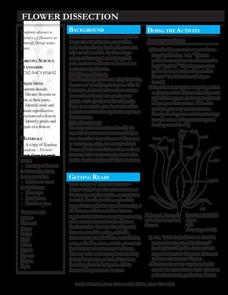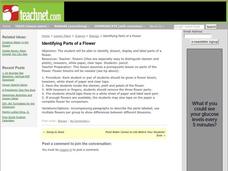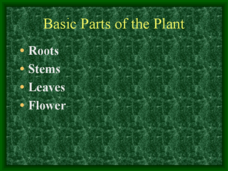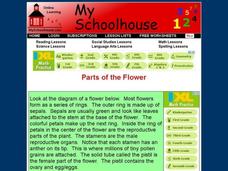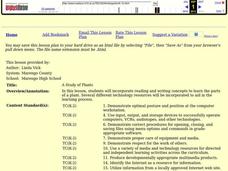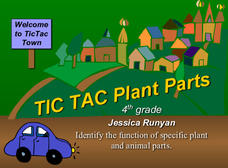Curated OER
Parts of the Plants
Second graders discuss as a class what they know about plants viewing several pictures of plants as well as a tree poster. They work in groups to observe a flowering plant which is removed from a pot with the soil brushed away and is...
Curated OER
Flowers and Their Life Cycles
First-time florists will be able to label the structures of simple and composite flowers after reading this handout and answering the comprehension questions. There are a couple of grammatical errors in the text, but the content is...
Curated OER
Paper Plate Sunflowers
A great way to recall the parts of a flower is to make one. Little learners create sunflowers out of paint and paper plates. They also discuss and label the various parts of their flowers.
Curated OER
Flowers and Their Friends
Students study the basic parts of flowering plants. They explore flower characteristics that attract various bird and insect pollinators. Afterward, they represent real or imaginary flowers and pollinators based on their knowledge of...
Curated OER
Flower Power
Students explore the parts of flowers and how they reproduce. They dissect flowers and observe the reproductive organs. Students observe anthers and ovaries of Tiger Lilies under a microscope. They investigate how insects and other...
Curated OER
Flower Dissection
Beginning biologists pull a flower apart and familiarize themselves with the different reproductive structures. Why have them learn only from just a book or diagram when they can examine real samples? There is no link to the referenced...
Curated OER
Six Plant Parts
Students create a harvest burrito out of fruit, flowers, roots, stems, and more. In this plants lesson plan, students go out into the garden and identify the 6 plant parts.
Curated OER
Flower Painting/Printmaking
Using old or donated flowers, little learners create flower prints. They discuss the colors found in nature, paint a background, and then create flowers for their pictures by dipping and pressing real flowers onto their paper.
Curated OER
Plant Parts
Little ones identify the parts of a plant and practice following directions at the same time. They color each part of the flowering plant the color indicated on the sheet. Roots are brown, leaves are green, the flower is red, and the...
Curated OER
Identifying Parts of a Flower
Students identify, dissect, display and label parts of a flower. They dissect lilies and label each part as they tape it to a white sheet of paper.
Curated OER
Parts of the Flower and Pollination
Students review the parts of the plant and recognize the parts that are important for pollination. For this pollination lesson, students illustrate and label the parts of a flower. Students compare different types of flowers.
Curated OER
Distinguishing Between Flowers
A branching key is a great way to classify different types of animals and plants! Fifth graders answer several yes/no answers about three different plants. They then create their own key to differentiate between an iris, a rose, and a...
Curated OER
Basic Parts of the Plant
Beginning botanists learn basic plant structure by viewing this presentation. It is somewhat lifeless because there are no photos, so you will want to display actual plants as you work through the slides. The information, however, is...
The Science Spot
Flower Basics
Learn about plants and pollination with a learning exercise about the parts of a flower. After labeling the anatomy of a flower using a word bank, kids explain the difference between self-pollination and cross-pollination, and unscramble...
Curated OER
From Flower to Fruit
Second graders examine the parts of a flower and how pollination occurs. In this flowers and pollination lesson plan, 2nd graders examine the parts of a flower with a hand lens focusing on the pollen. They watch as a pollinator such as a...
Curated OER
Parts of the Flower
For this biology worksheet, students examine a diagram of a flower and read a selection that describes all of the parts including the petals, the stamen, the anther, and the sepals. They answer 11 on-line fill in the blank questions...
Curated OER
Yummy Plant Parts
Students examine plant parts. In this botany lesson, students examine various edible plants and how their adaptations help them to grow. They observe stems, leaves, roots and flowers of plants and discuss the relationship between the...
Curriculum Corner
Bugs and Flowers Math and Literacy Centers
The sun shines, flowers bloom, and bugs fly—it must be Spring! Add a cheerful theme of bugs and flowers to math and literacy centers. Scholars take part in an assortment of activities designed to reinforce concepts such as identifying...
Curated OER
A Study of Plants
Using a variety of multi-media resources, your high schoolers become familiar with the parts of plant and create a story about plants using vocabulary learned during their research of plants. Completed stories are published using the...
Arts & Humanities
Make Your Own Flower Garden
Get into art with a little activity on flower parts. The class reviews basic information regarding flowers and then they use a paper mosaic technique to create visual representations of the lovely plants.
Curated OER
Insects Around Us
Students fill out worksheets about insects and how they are helpful to our world. For this insects lesson plan, students learn about flower parts and insects that pollinate them.
Curated OER
Learning About Plants- Flowers for a Special Occasion
Students explore the parts of plants and discover that plants need to grow. In this plant lesson, students discuss the parts of the plant and plant petunias. Students can share their plants with friends or families.
Curated OER
How Do Flowering Plants Reproduce
Students investigate how flowering plants reproduce. They identify and describe the functions of the major sexual organs of a flower and fruit by examining and dissecting flowers and fruit.
Curated OER
Tic Tac Plant Parts
This plant biology PowerPoint introduces plant parts and their functions. This PowerPoint allows students to identify each plant part on a diagram, along with its' function. The slides contain a clear explanation of how each plant part...







